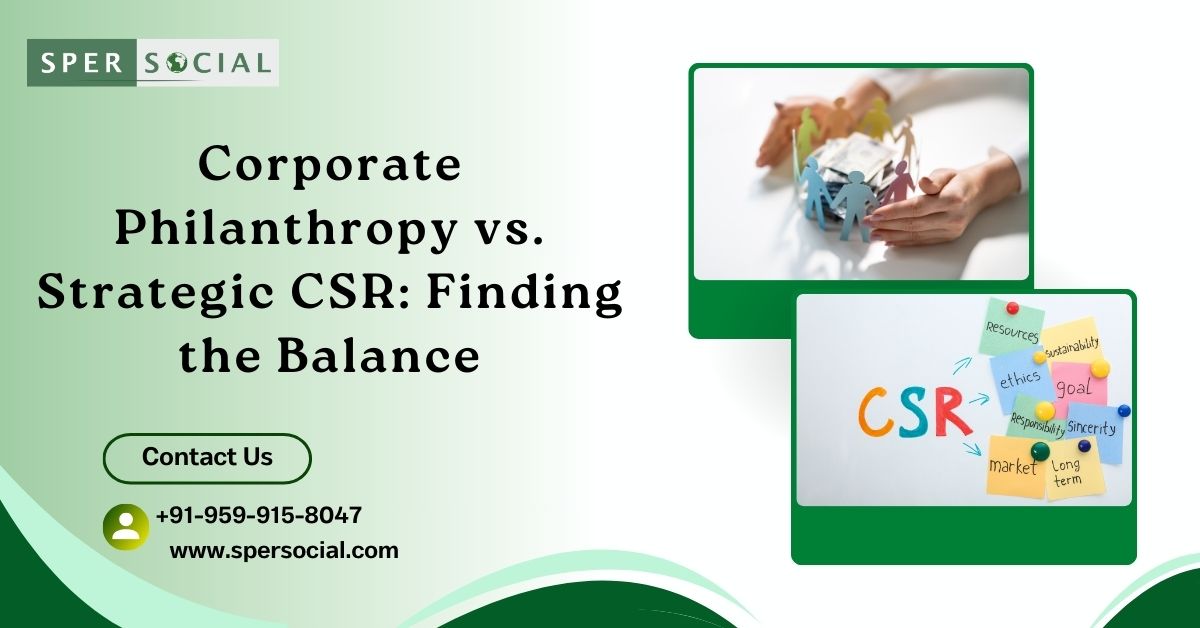
In the evolving landscape of business, companies are increasingly held to higher standards of social responsibility. Two major approaches—corporate philanthropy and strategic corporate social responsibility (CSR)—often come into play.
In this article, we’ll break down the key differences between corporate philanthropy and strategic CSR, examine how companies can benefit from each, and provide guidance on how to balance these strategies for long-term success.
What is Corporate Philanthropy?
Corporate philanthropy refers to the traditional model of giving, where a business donates resources—such as money, time, or products—to charitable causes. It’s often viewed as a way for companies to "give back" to the communities they serve, regardless of whether the act benefits their business directly.
Corporate philanthropy is typically a more reactive approach, where companies respond to immediate needs, such as disaster relief efforts or community fundraising events.
What is Strategic CSR?
On the other hand, Strategic CSR (Corporate Social Responsibility) involves integrating social responsibility into the core business strategy. Instead of merely donating resources, companies using this approach focus on aligning their CSR efforts with their business objectives, creating both social and economic value.
Key Differences Between Corporate Philanthropy and Strategic CSR
While both corporate philanthropy and strategic CSR aim to make a positive impact, they differ in several fundamental ways.
1. Focus on Giving vs. Creating Shared Value : Corporate philanthropy primarily focuses on charitable giving. In contrast, strategic CSR aims to create shared value, where both the company and society benefit from the initiative.
2. Reactive vs. Proactive Approach : Philanthropy is often reactive, responding to social issues as they arise. CSR, on the other hand, is proactive, identifying long-term social trends and integrating them into the company’s strategy.
3. Short-term Impact vs. Long-term Sustainability : Corporate philanthropy tends to have short-term effects—such as supporting a charity event or making a one-time donation—whereas CSR is about building long-term sustainability, both for the business and society.
Advantages of Strategic CSR
Strategic CSR offers a more long-term, sustainable approach. Some of its key benefits include:
Brand Loyalty: Consumers are more likely to support companies that align with their values.
Business Sustainability: CSR initiatives often lead to innovations that improve both societal outcomes and business performance.
Competitive Edge: Companies practicing CSR are more likely to attract top talent and investors interested in social impact.
Challenges with Corporate Philanthropy
Corporate philanthropy, while beneficial, can face some hurdles:
Lack of Measurable Impact: It’s often difficult to track the long-term effects of one-time donations or sponsorships.
No Alignment with Business Goals: Philanthropy doesn’t always directly benefit the company’s bottom line or strategy.
Challenges with Strategic CSR
Although CSR is a more integrated approach, it’s not without its own set of challenges:
Complexity in Implementation: Aligning CSR with business operations can be difficult and resource-intensive.
Measurement Difficulties: Gauging the success of CSR initiatives in both social and business terms can be tricky.
How to Balance Corporate Philanthropy and Strategic CSR
So how can companies strike the right balance between corporate philanthropy and strategic CSR? The key lies in blending short-term philanthropic efforts with long-term CSR goals. This means combining traditional giving with initiatives that are tied to your business objectives.
Steps to Achieve Balance:
Set clear objectives for both philanthropy and CSR.
Engage stakeholders (employees, customers, and communities) in both efforts.
Measure and track the social and business outcomes of each initiative.
Examples of Companies Successfully Balancing Both:
Several companies have managed to balance corporate philanthropy with strategic CSR. For example:
Google: Through its philanthropic arm, Google.org, it provides funding for various charitable initiatives while aligning its CSR efforts with innovation and technology to drive social change.
Patagonia: Known for its environmental activism, Patagonia combines philanthropy with strategic CSR by making sustainable business practices a core part of its operations.
Impact on Society: Corporate Philanthropy vs. Strategic CSR
While corporate philanthropy can have an immediate social impact, strategic CSR can lead to sustainable change that benefits both society and businesses over the long term.
Social Benefits Comparison:
Philanthropy provides short-term relief to specific causes.
CSR fosters long-term change by addressing the root causes of social issues.
Business Benefits Comparison:
Philanthropy may boost immediate public perception.
CSR builds sustainable brand value and competitiveness.
Future of Corporate Philanthropy and Strategic CSR
Looking ahead, the focus will increasingly shift towards strategic CSR, with companies embedding ESG factors into their core business strategies. Corporate philanthropy will continue to play a role, but it will likely be one part of a larger, more integrated approach.
Conclusion
Both corporate philanthropy and strategic CSR have their place in today’s business world. While philanthropy addresses immediate needs, strategic CSR drives long-term, sustainable change. By balancing both approaches, companies can maximize their social impact while reaping the benefits for their business.
SPER SOCIAL
SPER SOCIAL, your premier destination for innovative solutions in Corporate Social Responsibility (CSR) and Environmental, Social, and Governance (ESG) initiatives. At SPER SOCIAL, we pride ourselves on our expertise, tailored solutions, global perspective, and commitment to long-term impact. With a passion for sustainability and a dedication to making a difference, we empower organizations to navigate the complexities of CSR and ESG with confidence and purpose.
#303-304, Tower B, Noida One, Sector 62, Noida, India
contact@spersocial.com
+1-347-460-2899
+91-959-915-8047
